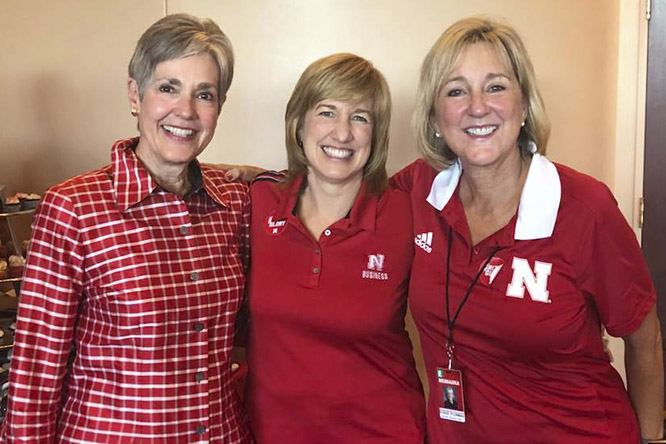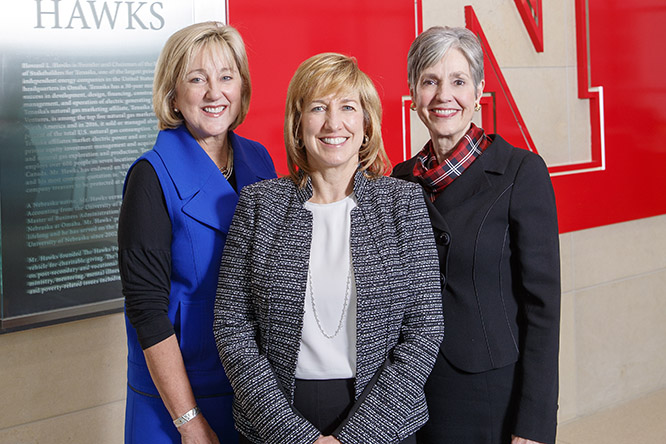Bringing distinctive leadership styles and strong family backgrounds to their role as dean, three women – Cynthia Milligan, J.D.; Dr. Donde Plowman; and Dr. Kathy Farrell – ushered in a new era of success for the College of Business. Building upon each other’s strengths and momentum, they transformed the college into a leading business school affectionately known as Nebraska Business.
Cynthia Milligan, the eighth dean and first woman dean, paved the way with her business perspective. Familiar with higher education through her father and former chancellor at Nebraska, Dr. Clifford Hardin, Milligan brought expertise as a lawyer and business leader. She also learned about leadership from Hardin, who also served as the U.S. Secretary of Agriculture.
“I learned about various leadership styles needed for different positions through his experiences in academia, government and business. I also learned about listening to people’s points of views and working toward consensus,” said Milligan.
 Cynthia Milligan, Dean Kathy Farrell and Donde Plowman, then executive vice chancellor at Nebraska, attended the Chancellor's Tailgate prior to the 2018 football season opening game against Akron. Due to weather, the game was cancelled.
Cynthia Milligan, Dean Kathy Farrell and Donde Plowman, then executive vice chancellor at Nebraska, attended the Chancellor's Tailgate prior to the 2018 football season opening game against Akron. Due to weather, the game was cancelled.
Milligan helped create the J.D. Edwards Honors Program at the university, now called the Jeffrey S. Raikes School of Computer Science and Management, with the goal of better educating future business executives in technology. She also increased support for international business programs and started a preparatory class for all freshmen in business, which continues today as BSAD 111.
“Cynthia began the process of elevating the research stature of the college. Many people don’t know she created the white paper to argue for the implementation of differential tuition (a separate tuition structure for the college),” explained Farrell, who taught finance when Milligan served as dean.
A practicing attorney in Washington, D.C., she served as president of Milligan and Associates, education advisor to former Nebraska Governor Kay Orr and director of the Nebraska Department of Banking and Finance. Milligan also taught tax law at Georgetown Law School.
“Cynthia brought integrity and principles to the Office of the Dean and that office’s integrity has never been challenged since. She played a huge role in CBA becoming Nebraska Business,” Plowman said.
Milligan retired in 2009, opening the door for Plowman, a professor in strategic management who researched organizations and leadership. As the daughter of a minister, she also brought a contagious energy, which served her well when bringing people together.
“I watched my dad lead, grow churches and solve problems,” said Plowman. “My mom was very social and we hosted potlucks both at the church and at home to build community.”
Plowman’s arrival in 2010 coincided with Nebraska’s entry into the Big Ten. To make the college competitive in the conference, she led the creation of distinctive business programs, such as the Honors Academy, Career Center and Clifton Strengths Institute. She also spearheaded a summer program for high school juniors called the DREAMBIG Academy.
“Dean Plowman implemented differential tuition, which allowed more financial resources to hire much-needed additional faculty,” Milligan said.
However, to ultimately build the new $84 million building needed to contend in the Big Ten, she knew sharing information was key to capturing people's interest.
“The challenge was selling something we hadn’t built yet and at the same time, start to build something we could sell. I assembled a phenomenal leadership team who made that possible. Another part of our success was building a communications team that put us on the map. We became sophisticated in telling our story,” she said.
With help, hard work and the frequent use of the tagline, Start Something, full funding for the new $84 million building was raised through private donations. With construction underway, Plowman received the call to serve as executive vice chancellor at the university.
Farrell, who formerly worked as a CPA and earned her Ph.D. in finance prior to joining the college in 1993, was chosen as interim dean. As a daughter of the assistant superintendent of personnel at the Rush-Henrietta School District near Rochester, New York, she witnessed the power of people working together to make her community thrive.
“I learned early the importance of hard work, determination and giving back,” said Farrell. “My father was very active in the community and my mother supported his volunteerism. For years, she organized a charity golf event to raise money for a Rotarian summer camp for disabled children.”
Inspired by her parents’ example, Farrell sought leadership roles while growing up. She ran for president of her high school senior class against one of the school’s most popular student-athletes.
“It was a test of perseverance and willingness to take a risk even though there was a high chance of failure. I learned how to share a strategic vision. It taught me that not everyone will agree with every decision a leader makes. But if you do what you believe is right and just, then you will be able to carry yourself with confidence,” she said.
Passing the CPA exam in one sitting, she moved to Baltimore, Maryland, to work as an auditor for what now is KPMG. After three years in public accounting, she chose to pursue her dream job as a professor. This led her to Nebraska, where she served in numerous roles, such as professor of finance, chair of the Department of Finance and senior associate dean. Named interim dean on December 2016, she felt compelled to seek the “permanent” dean position.
“I didn’t want to just be a dean, I wanted to lead the college I had committed to for my entire academic career. It was truly a pivotal time in the college’s history,” she said. After helping build the positive trajectory of the college for four years as senior associate dean and one year as interim dean, Farrell took the helm as the college’s tenth dean in December 2017.
“Kathy is the right leader to take the college to the next level. As a trained accountant who is financially sophisticated, she is excellent at executing because she thinks through the details. Her analytical strengths give others confidence in her choices,” said Plowman, who now serves as chancellor of the University of Tennessee, Knoxville.
 Donde Plowman, Dean Kathy Farrell and Cynthia Milligan built on each other's success to advance the college now known as Nebraska Business.
Donde Plowman, Dean Kathy Farrell and Cynthia Milligan built on each other's success to advance the college now known as Nebraska Business.
Farrell immediately kicked off a new strategic planning process with 60 faculty, staff, students and alumni. Last summer, she launched the new strategic plan.
“My top goal was to engage in an inclusive strategic planning process and create a common set of goals to help guide our decision making. I am proud of our new mission and guiding principles, and the overall strategic initiatives we identified,” said Farrell. “We’ve also accomplished several mission-focused and success-enabling goals in less than a year.”
She believes one of the biggest accomplishments in these strategic initiatives so far is the success in donor support. In addition to securing a $2.5 million matching gift for five endowed faculty chairs and obtaining four matches in less than a year, she implemented the Seacrest Teaching Fellows program, launched the Nebraska Family Business initiative and increased free tutoring available for business students. Support from alumni and friends made each of these efforts possible.
“There was concern we might have donor fatigue after raising $84 million for the new building. For the continued advancement of the college, it’s critically important for us to continue to build and strengthen relationships with alumni, business partners and friends,” she said. “As Tonn Ostergard said at our building gala, ‘This is only half-time. We had an excellent first half by constructing a new building, but we need to finish strong by focusing on the programs and people inside it.’”
To further enhance the college’s connection to Nebraska’s business community, Farrell hired an executive in residence. Faculty also created new online graduate programs to help answer workforce demands. Executive Education transformed into the Center for Executive and Professional Development to reflect expanded continuing education for professionals and custom programs to help organizations reach strategic goals. Currently, she spearheads strategic initiatives such as developing a new law and business major, aligning scholarships with enrollment goals, and creating a program to foster a culture of engagement and recognize highly-engaged students.
“Under all three deans’ leadership, the college adapted to the needs of the community to advance the future of business and provide a rewarding experience for all stakeholders. Our new mission statement ends with, ‘We are Nebraska Business.’ To me, this represents how all of us – administrators, faculty, staff, students, alumni, donors, business partners and friends – have to come together to successfully build a world-class college. By working together and investing in each other, we will drive discovery, create opportunity and empower individuals,” said Farrell.
Published: January 23, 2020